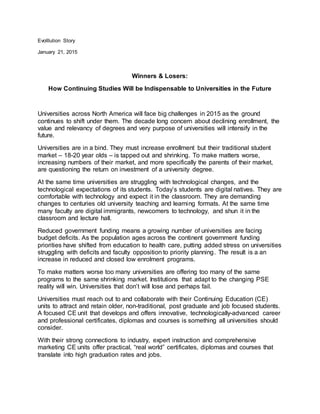Evolllution Story - Winners & Losers
- 1. Evolllution Story January 21, 2015 Winners & Losers: How Continuing Studies Will be Indispensable to Universities in the Future Universities across North America will face big challenges in 2015 as the ground continues to shift under them. The decade long concern about declining enrollment, the value and relevancy of degrees and very purpose of universities will intensify in the future. Universities are in a bind. They must increase enrollment but their traditional student market ŌĆō 18-20 year olds ŌĆō is tapped out and shrinking. To make matters worse, increasing numbers of their market, and more specifically the parents of their market, are questioning the return on investment of a university degree. At the same time universities are struggling with technological changes, and the technological expectations of its students. TodayŌĆÖs students are digital natives. They are comfortable with technology and expect it in the classroom. They are demanding changes to centuries old university teaching and learning formats. At the same time many faculty are digital immigrants, newcomers to technology, and shun it in the classroom and lecture hall. Reduced government funding means a growing number of universities are facing budget deficits. As the population ages across the continent government funding priorities have shifted from education to health care, putting added stress on universities struggling with deficits and faculty opposition to priority planning. The result is a an increase in reduced and closed low enrolment programs. To make matters worse too many universities are offering too many of the same programs to the same shrinking market. Institutions that adapt to the changing PSE reality will win. Universities that donŌĆÖt will lose and perhaps fail. Universities must reach out to and collaborate with their Continuing Education (CE) units to attract and retain older, non-traditional, post graduate and job focused students. A focused CE unit that develops and offers innovative, technologically-advanced career and professional certificates, diplomas and courses is something all universities should consider. With their strong connections to industry, expert instruction and comprehensive marketing CE units offer practical, ŌĆ£real worldŌĆØ certificates, diplomas and courses that translate into high graduation rates and jobs.
- 2. Offering flexible consumer-friendly experiential programs and courses CE units build on their universityŌĆÖs academic strength by providing their students a value-added education. For example, according to grads, VancouverŌĆÖs Simon Fraser University CE Public Relations Certificate, a six week full time program with a practicum, acts a ŌĆ£finish schoolŌĆØ for the universityŌĆÖs Communications degree. CE units are experts at developing timely and financially successful programs aimed at labour market needs. They give universities ŌĆ£curb appealŌĆØ for new and current students by offering programs and courses that tap into market changes, social trends and community interest. SFU currently offers more than 300 and 30 programs - from a one day SEO boot camp to a new Craft Beer and Brewing Essentials Certificate to a 14 month online Business to Business Content Marketing Certificate. Peter Walton is an Associate Director in the Career and Professional Programs area of Continuing Studies at Simon Fraser University. He manages the Public Relations, Business to Business Content Marketing, Digital and Mobile Marketing and New Media Journalism programs as well as the SFU Boot Camps.

